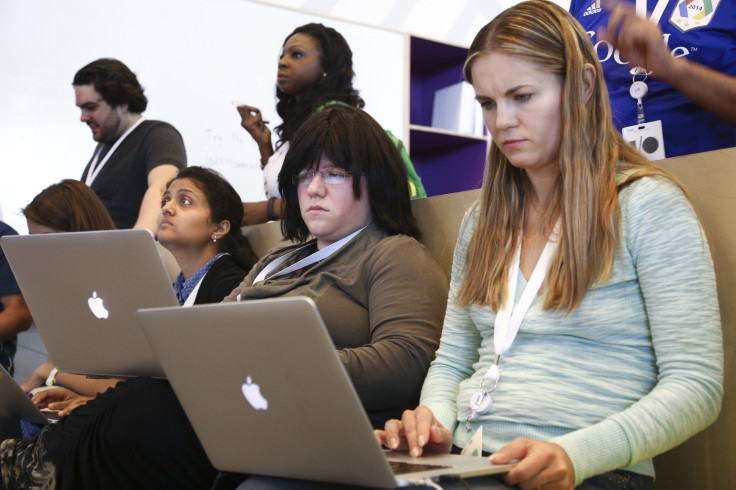Tinder Sexual Harassment Scandal Could Help Women In The Tech World

The tech industry's most recent sexual harassment scandal could be seen as yet another piece of proof that the male-dominated ecosystem remains inhospitable to women. But while the sexual harassment accusations brought against Tinder by the dating app’s former exec Whitney Wolfe reinforce some of the ugliest stereotypes about tech companies, they don’t necessarily mean that tech will always be a boy’s club.
“If anything, it’s galvanizing folks to fight harder to be represented,” said Susan McPherson, a consultant and angel investor. “I do believe that there’s a real sense of ‘We are going to be on top of this; we’re not going to give up.'”
On Monday, Wolfe filed a lawsuit against Tinder CEO Sean Rad and the chief marketing officer Justin Mateen, accusing Mateen – a former boyfriend – of harassing and threatening her, and Rad of ignoring her complaints and incidents he witnessed. In response, Tinder’s majority stakeholder IAC/InterActiveCorp suspended Mateen pending an internal investigation (while also challenging the factual accuracy of Wolfe’s suit).
Many reports emerging from the tech world show a pattern of anti-woman behavior. In May, Snapchat’s 23-year old CEO Evan Spiegel was scandalized when Valleywag published college emails in which the then-student's emails referred to female classmates as “b*tches” and sororisl*ts.” And in April, Gurbaksh Chahal, founder and CEO of Silicon Valley ad-tech firm RadiumOne, was fired after being charged with 45 felony counts of domestic abuse.
But as disturbing as some of these scandals are, McPherson believes the unrelenting bad press may present an opportunity for women entrepreneurs, who are far less likely than their male peers to receive venture capital funding.
“This is going to give [VC firms] pause for thought,” McPherson said. “I think this could be the real turning point behind the whole mechanism for funding,” she said, “because you don’t see this happening in organizations run by women. You just don’t.”
Nihal Mehta, founding partner of mobile tech venture capital firm Eniac Ventures, agrees that the funding mechanism needs to change in order to make sure entrepreneurs are ready to take on the challenges of running a company.
“Investors need to do more due diligence on the entrepreneur’s character,” Mehta said. “Dig into the actual entrepreneur a little more, get some professional as well as personal references and ask, ‘What is this person really like?’”
Mehta said that Eniac -- which backed Hinge, arguably Tinder’s strongest competition -- is already committed to what he calls “character due diligence,” and hopes that it will become a bigger trend among other investors.
McPherson believes the scandal isn’t something Tinder should expect to be able to sweep under the rug. “Tinder is not such a techie app that John Q. Public just kind of looks away. So many people are using it, and if they’re not using it, they know about it. It’s a very consumer-facing application,” she said.
Perhaps if Tinder’s investors had performed more due diligence on its founders, they might have seen a red flag. Mehta said that Eniac has walked about from potential investments as a result of character references, though he said that none were passed up because of a history of sexual harassment or abuse.
“It’s unfortunate that these folks get funded and get big companies and then all these things come out, which I think can be detrimental to the entire culture,” Mehta said.
And it’s a culture that both Mehta and McPherson firmly believe will benefit by a greater influx of women.
"I hope it will encourage more to enter so there can be a little bit more gender parity and less of this frat-boy kind of attitude that’s going on,” Mehta said.
© Copyright IBTimes 2024. All rights reserved.






















